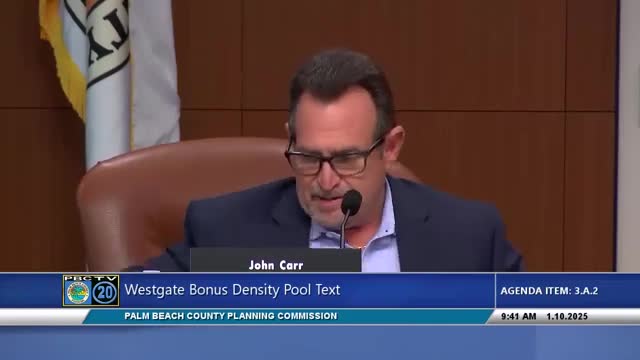Commission denies request to reclassify Acreage site for gas‑station‑led commercial project
Get AI-powered insights, summaries, and transcripts
Subscribe
Summary
The Planning Commission voted 8‑4 to deny a proposed comprehensive plan amendment to reclassify a 5.93‑acre Acreage parcel from Rural Residential 2.5 to Commercial Low, citing incompatibility with the neighborhood plan and proximity to single‑family homes.
The Planning Commission denied a proposed comprehensive plan amendment that would have changed a 5.93‑acre parcel in The Acreage from Rural Residential (1 unit per 2.5 acres) to Commercial Low. The applicant proposed a concurrent rezoning to a Multiple Use Planned Development (MUPD) with a gas station (12 fueling positions and convenience store), a drive‑through restaurant and other retail totaling about 11,900 square feet.
Applicant representative Jeannie Ducharme described demographic and land‑use changes since the Acreage neighborhood plan and Western Northlake Corridor study were written, and argued local population growth and new nearby subdivisions justify commercial services close to the intersection. The applicant’s attorney, Brian Seymour, said the comprehensive plan amendment was triggered by the site’s changing context at a widening intersection and that the requested land‑use change met exurban‑tier location criteria for Commercial Low.
County planning staff recommended denial. Planner Bryce Van Horn told the commission the site does not meet the Acreage Neighborhood Plan recommendations (which in part limit fuel stations in the plan area) and that existing approved commercial capacity in the corridor already exceeds the Western Northlake Corridor study’s demand findings. Staff also emphasized compatibility concerns: the developable portion of the parcel is about 4.3 acres after right‑of‑way, and the site shares a property line directly with single‑family homes to the south; staff concluded the applicant’s high‑trip, vehicular‑oriented uses were not compatible with adjacent residences.
Several residents and the Acreage Landowners Association spoke in opposition. Lisa Johnson, a resident and past participant in the neighborhood plan process, cited the Acreage plan language that limits petroleum facilities and calls for protecting rural character. Eleanor Burgess described traffic, wildlife and infrastructure impacts, saying residents do not want more gas stations or drive‑through restaurants.
Commissioners discussed compatibility, precedent, traffic and environmental risks associated with locating fueling facilities adjacent to retention areas and private wells. One commissioner noted prior neighborhood opposition to a different commercial request at a nearby location. The commission voted to deny transmission of the proposed future‑land‑use amendment; the motion passed 8‑4. Staff recorded that the Acreage Landowners Association submitted a letter supporting staff’s denial.
Why it matters: The decision preserves the Acreage neighborhood plan’s intent to limit certain vehicular‑intensive commercial uses and underscores the commission’s emphasis on compatibility when a small site is directly adjacent to single‑family homes. The outcome means the applicant may revise its proposal or pursue a different site or alternative land‑use request.
What’s next: Because this was a future‑land‑use amendment submittal, denial at the Planning Commission stage ends the applicant’s path to transmit the change to the Board of County Commissioners unless the applicant files a revised application.
